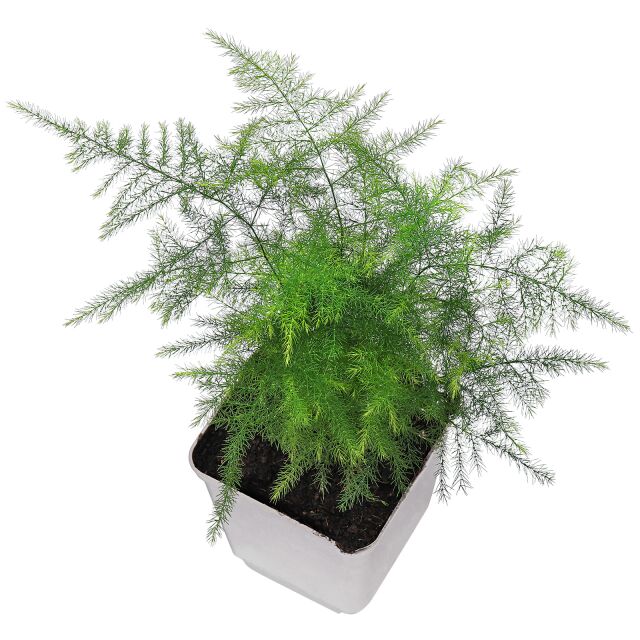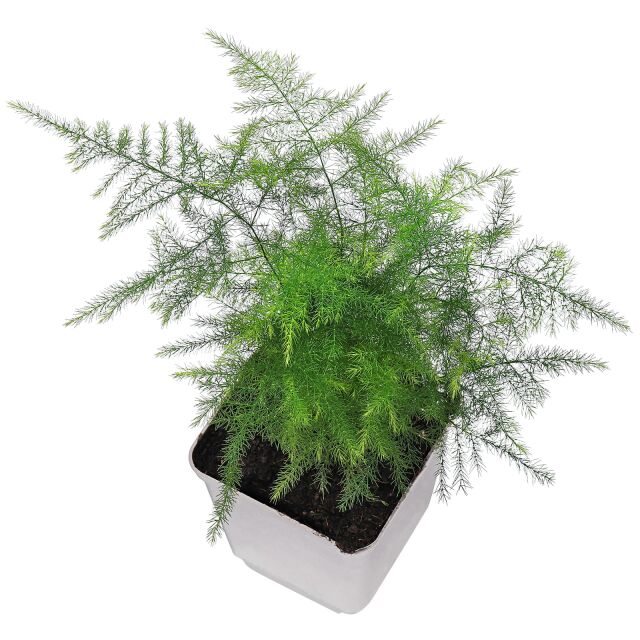


Terrarienpflanzen Asparagus setaceus
- Feathery foliage
- From tropical and subtropical regions
- Versatile use
- Easy to care for
Sign in or Register
Item question
We’re here for you!
Please enter your question and e-mail and we’ll contact you as soon as possible. It usually takes us up to 24 hours during business days to respond.
Thank you for your question!
Thank you, we’ll get in touch!
Close window
You already sent us a question.
Please wait a few minutes
Description
This asparagus is a climbing plant that at first glance looks like a very finely feathered fern. Hence its common name "Asparagus fern", although it has nothing to do with ferns. Asparagus setaceus, also known as Asparagus plumosus and "A. plumosa", is native to forests in tropical and subtropical East and Southeast Africa, in areas with alternating wet and dry seasons. Green, wiry stems grow from a rhizome, twining several meters high with backward-facing thorns at the stem nodes. In older plants, new stems sprout from the ground at intervals of approx. 5 - 15 cm, sometimes more. The side branches are filigree branched in one plane and covered with very fine, leaf-like branches (cladodes) about 5 - 7 mm long and 0.1 mm wide. Small greenish-white bell-shaped flowers can appear at the ends of the branches. The Climbing asparagus is often supplied as a young plant around 10 - 15 cm high, the stems are then still very thin. Only with time do increasingly longer, stronger, climbing stems sprout.
This ornamental asparagus thrives in well-drained soil. The substrate should be kept slightly moist, but waterlogging should be avoided. Thanks to its strong rhizome and root system, the plant tolerates temporary drought and irregular watering. Once it is well established, it can be fed occasionally with a houseplant fertilizer. Asparagus setaceus is very temperature tolerant and can also overwinter at around 10 - 15 °C, but should then be kept drier. Long shoots can be pruned if you want to keep Asparagus as a bushy ground plant rather than a climber. Propagation is by rhizome division. Excessive spreading of the rhizome can be prevented by placing the plant in a pot in the terrarium or in the terrarium floor.
Asparagus setaceus can be used in many ways in terrariums and is an eye-catcher with its delicate, feathery, deep green fronds. As a young plant, the Climbing asparagus is suitable for small containers and can be kept bushy by pruning. With its upright green stems, it is reminiscent of a small bamboo grove. Older, free-growing plants form a thicket with their climbing stems on climbing aids such as branches and twigs. This asparagus species is suitable for humid to moderately dry, tropical terrariums that are warm all year round as well as subtropical terrariums that are kept cooler in winter.
Profile
| Asparagus setaceus | |
| Cultivation Options | Terrestrial; twining plant |
| Growth height | Approx. 10 - 100 cm |
| Temperature | Approx. 10 - 27 °C |
| Humidity | At least about 50 % |
| Light Requirement | Moderately bright (half shade) to bright, no direct midday sun if cultivated in daylight |
| Watering | Regularly, allow the soil to dry slightly on the surface between waterings, avoid waterlogging; keep drier if overwintered in cool conditions |
| Fertilisation | Every two weeks with diluted liquid fertiliser during the growing season |
| Propagation | Division of the rhizome |
| Suitable for | Various moderately humid tropical and subtropical terrariums |
| Cultivation Options |
| Terrestrial; twining plant |
| Growth height |
| Approx. 10 - 100 cm |
| Temperature |
| At least about 50 % |
| Humidity |
| At least about 50 % |
| Light Requirement |
| Moderately bright (half shade) to bright, no direct midday sun if cultivated in daylight |
| Watering |
| Regularly, allow the soil to dry slightly on the surface between waterings, avoid waterlogging; keep drier if overwintered in cool conditions |
| Fertilisation |
| Every two weeks with diluted liquid fertiliser during the growing season |
| Propagation |
| Division of the rhizome |
| Suitable for |
| Various moderately humid tropical and subtropical terrariums |
| Other |
Terrarienpflanzen
Our terrarium plants give every terrarium an individual, natural atmosphere and at the same time provide a healthy environment for all terrarium inhabitants. Our wide range of tropical, subtropical and even arid plants are easy to combine and enhance any terrascape. Whether it's strong succulents, subtle tillandsias, eye-catching neoregelias or wonderful orchids - we offer terrarium plants for different terrascapes from rainforest to desert.
General information
Please choose a variant to see more information.
| Item no. |
|
| EAN | |
| Weight | |
| Shipping weight |
Customers ask customers
You have questions about this product? Ask other customer or our support team about this product!